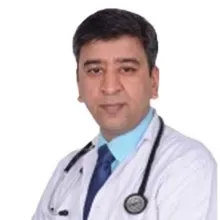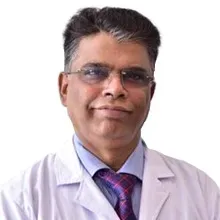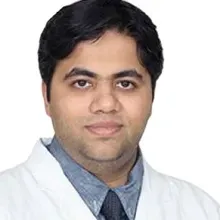About Doctor DR. SURENDER KUMAR DABAS
About
With more than 20 years of expertise, Dr. Surender Kumar Dabas is a highly skilled surgical oncologist and robotic surgery specialist. Robotic, scarless head and neck surgery, robotic surgery for
colorectal, prostate, bladder, and kidney cancer, as well as robotic surgery for esophageal and lung cancer, are some of his particular areas of interest. Over 20,000 complex cancer surgeries, including 2,500 robotic surgeries, have been completed by him. He is a worldwide mentor for robotic oncology surgeries, in addition to being a prominent pioneer of the robotic surgical oncology program in India. He has the record for completing the most Head and Neck Oncosurgeries in Asia and has been teaching robotic surgery throughout India. The University of Chicago trained and qualified him to undertake robotic pancreatic surgery, making him the only cancer surgeon in India with this skill set.
He earned a DNB in surgical oncology and an MS in general surgery after earning his MBBS. Dr. Dabas has written a number of scholarly articles for both domestic and foreign media and has delivered eminent lectures at several medical conferences. He is a respected member of the Indian Association of Surgical Oncology (IASO), the Foundation of Head-Neck Oncology (FHNO), and the Executive Council Membership of the International Guild of Robotic and Endoscopic Head-Neck Surgeons (IGREHNS).
Work Experience
20 Years of Experience
In oncology, Dr. Surender Kumar Dabas has a wealth of experience. He is an international mentor of robotic surgery and a pioneer of robotic head and neck surgery in India. His clinical interests include gynecological surgery, robotic thoracic surgery, transoral robotic surgery, and robotic gastrointestinal surgery. He has actively contributed to the training of robotic surgeons throughout India. In Asia, he has performed the most robotic head and neck surgeries. He has published several articles both nationally and internationally. Following are some of his professional working experiences:
-
Chief of Head and Neck Oncology and Robotic Surgery at the Rajiv Gandhi Cancer Institute and Research Centre
-
Director Head and Neck and Thoracic Services at Fortis Memorial research Institute
-
Director Head and Neck and Thoracic Services at Fortis Hospital
Associated with Hospitals
List of Treatments
Dr. Surender Kumar Dabas is offering the following treatment procedures:
-
Adrenal Cancer Treatment: One or both of the tiny, triangular glands (adrenal glands) that are situated on the top of kidneys might develop adrenal carcinoma, a rare kind of cancer. Malignancy that has progressed to tissues close to the adrenal cortex is then surgically removed.
-
Chemotherapy for Solid Malignancies: Chemotherapy for solid malignancies is a treatment that uses drugs to destroy cancer cells. Because chemo affects the entire body, it can destroy cancer cells in the tumor as well as any cells that have broken out of it and traveled through the blood or lymph to another place.
-
Bladder Cancer Treatment: When a tumor, a development of abnormal tissue, forms in the bladder lining, the condition is referred to as bladder cancer. The main course of treatment for bladder cancer is surgery. The location of the malignancy determines the type of operation.
-
Radiotherapy: High doses of radiation are used in radiation therapy, commonly known as radiotherapy, as a cancer treatment to eradicate cancer cells and reduce tumor size. As with x-rays of teeth or shattered bones, radiation is utilized at low levels in x-rays to view inside the patient’s body.
-
Chronic Lymphocytic Leukemia (CLL): In the case of chronic lymphocytic leukemia, an excessive number of lymphocytes are produced by the bone marrow. Leukemia can have an effect on red blood cells, white blood cells, and platelets Surgical operations are performed for the treatment of this disorder.
-
IMRT: Conformal radiotherapy includes intensity-modulated radiation (IMRT). With conformal radiotherapy, the radiation beams are precisely shaped to fit the cancerous tissue. A linear accelerator (LINAC), a common radiation device, is often used for IMRT.
-
Tumors and Cysts: A cyst is a sac that can contain air, liquids, or other substances. Any portion of the body, including bones, organs, and soft tissues, can develop a cyst. Most cysts are noncancerous. Tumors are defined as any unwanted mass of cells or inflammation in the body. As compared to cysts, tumors are cancerous. Surgeries are often performed to treat tumors and cysts.
-
Melanoma Treatment: Disorders of the tumor cells are also known as melanoma. The primary therapy for melanoma is surgical removal of the original melanoma on the skin, known as excision. The melanoma's width determines how extreme the surgery will be. Most melanomas are discovered when they are less than 1.0 mm thick, and minimally invasive treatment is frequently all that is required.
-
Giant Cell Tumor Treatment: Curettage is the most commonly utilized surgical treatment to treat giant cell tumors. Special devices are used to remove the tumor from the bone during curettage, after which a bone transplant is performed. The opening is filled with a bone transplant after curettage to strengthen the bone.
-
Oral Cancer Treatment: Oral cancers can form on the tongue, the tissue that covers the mouth and lips, beneath the tongue, at the base of the tongue, and in the neck area towards the back of the mouth. Treatment for oral cancer includes a combination of surgery, radiotherapy, or chemotherapy.
Awards and Recognitions
-
TORS in Head and Neck Cancer (2014)
-
Completion Radical Surgery for Incidental Gallbladder Carcinoma, 2012
Publications
-
Presented paper on “TORS in Head and Neck Cancer and our experience” at China in May 2014 ,
-
Presented two posters on TORStitled “Transoral Robotic Surgery in Management of Oropharyngeal Cancers: A Preliminary Experience at a Tertiary Cancer Centre in India” and “Transoral Robotic Surgery For Recurrent or Residual Head and Neck Cancers: A Prospective Study of Feasibility and Functional Outcome” at 1st International TORS conference at Philadelphia, US, in August 2014
-
Dinesh A., Shukla H., Dabas S., et al: Simultaneous lingual and hypoglossal nerve block: a novel technique, Journal of the American College of Surgeons, 10/2015, 221(4):e133.
-
Dinesh A, Ranjan R, Shukla H, and Dabas S: Atypical carcinoid of larynx and management using transoral robotic surgery: Supraglottic laryngectomy, ASJO 01/2015; 1(1):55. · DOI:10.4103/2454-6798.165116
-
Dabas S, Dewan A, Ranjan R, Dewan AK, Shukla H, and Sinha R:Salvage Transoral Robotic Surgery for Recurrent or Residual Head and Neck Squamous Cell Carcinoma: A Single Institution Experience, Asian Pac J Cancer Prev. 2015;16(17):7627-32
-
Dewan AK, Dabas SK, Pradhan T, Mehta S, Dewan A, Sinha R: Squamous cell carcinoma of the superior gingivobuccal sulcus: an 11-year institutional experience of 203 cases, Jpn J ClinOncol. 2014 Sep;44(9):807–11.
Education and Training
-
MBBS - Maulana Azad Medical College, Delhi University, 2003
-
MS - General Surgery, Lady Hardinge Medical College, New Delhi, 2007
-
DNB - Surgical Oncology, National Board of Examination, India, 2011
Trainings/Specializations
Membership
-
Delhi Medical Council
-
Executive Council Membership of International Guild of Robotic and Endoscopic Head and Neck Surgeons (IGREHNS)
-
Foundation of Head and Neck Oncology (FHNO)
-
Indian Association of Surgical Oncology (IASO)
Registrations
Special Interest
 Associated with hospitals
Associated with hospitals
Envisioning the goals & paving the path to success for the organization.
Book Appoinment
Similar Doctors In New Delhi
Envisioning the goals & paving the path to success for the organization.

















